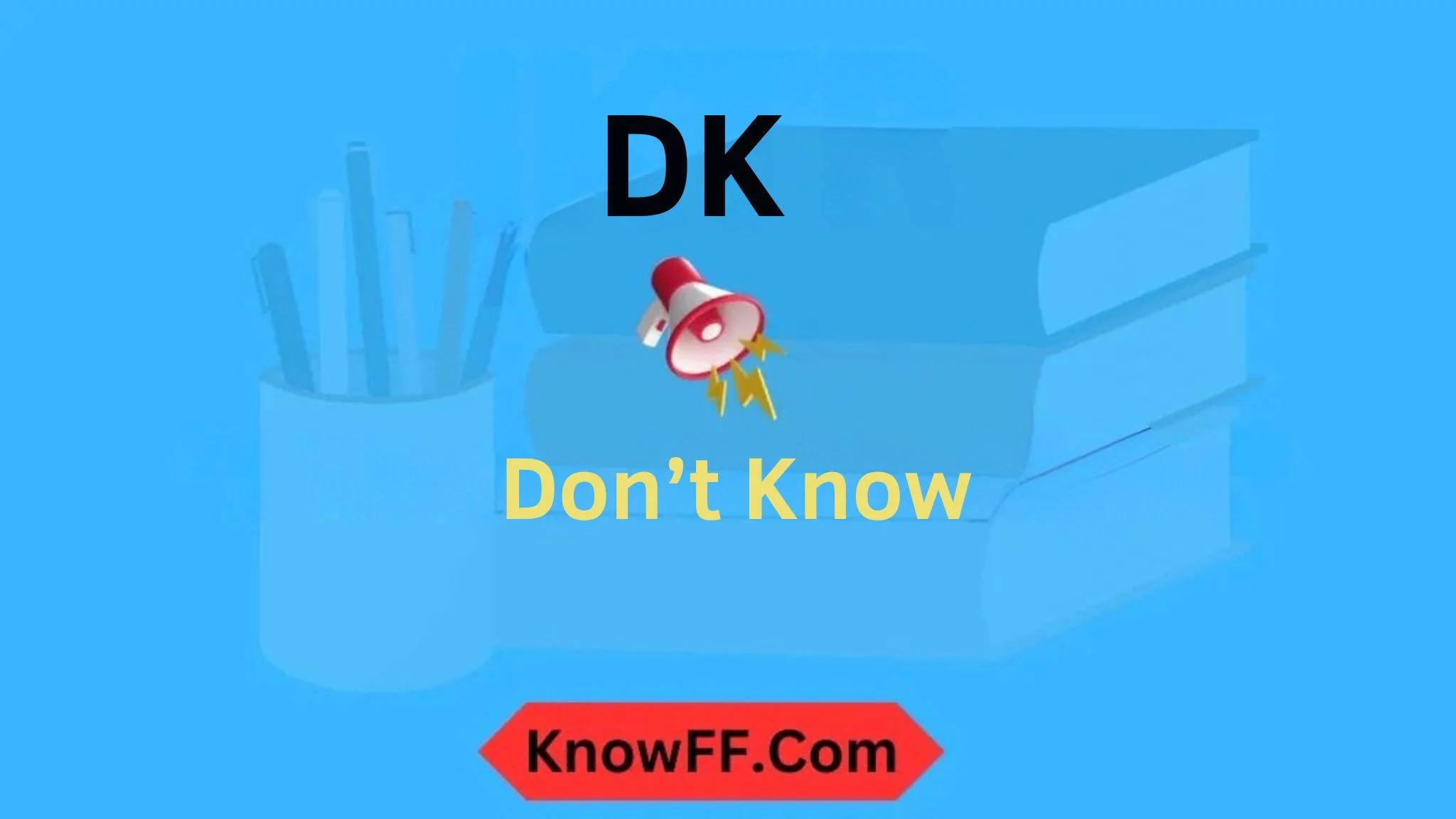The world of digital communication is filled with abbreviations and acronyms that simplify conversations. Among them, one of the most commonly seen terms is “DK.”
If you’ve ever scrolled through a social media feed, joined a group chat, or received a text message where someone typed “DK,” you may have paused and wondered what exactly it means.
People frequently search for “DK meaning in text” because its interpretation isn’t always straightforward. Depending on the context, it can mean different things.
For some, DK stands for “Don’t Know,” while in other situations, it can be shorthand for a name, a title, or even a reference in specialized fields.
This article will provide a detailed and structured exploration of DK, including its definition, background, everyday usage, role in professional and academic settings, misconceptions, and differences from similar abbreviations.
By the end, you’ll clearly understand when, how, and why people use DK in conversations.
Meaning & Definition
At its most common and widely accepted level, DK in text stands for “Don’t Know.” It’s a quick and casual way to say that someone is uncertain or doesn’t have an answer to a question. For example:
- Person A: “What time is the party tonight?”
- Person B: “DK, maybe around 8?”
In this context, DK works the same way as typing out “I don’t know,” but it saves time and fits well into the fast pace of online chatting.
However, DK doesn’t stop there. In different environments, it can have several meanings:
- Gaming context: Refers to “Donkey Kong,” a classic Nintendo character.
- Professional settings: Sometimes used for “Data Key” or “Domain Knowledge.”
- Names and Initials: Many people use DK as initials for their names, such as David Kim or Daniela Khan.
Thus, while the default meaning in casual text is “Don’t Know,” its application is much broader and highly dependent on context.
Background
The rise of abbreviations like DK is closely tied to the evolution of digital communication. In the early days of SMS texting, character limits forced people to shorten words.
Instead of typing long sentences, users preferred brief codes that conveyed meaning quickly. This was the origin of many shorthand expressions, including BRB (Be Right Back), LOL (Laugh Out Loud), TTYL (Talk To You Later), and DK (Don’t Know).
As technology advanced, these abbreviations carried over into instant messaging apps such as MSN Messenger, Yahoo Chat, and later, WhatsApp, Facebook Messenger, and Instagram DMs.
The popularity of DK particularly increased among teenagers and young adults who sought to communicate quickly without overexplaining. Interestingly, DK is not only a shorthand but also an example of how language adapts to new mediums of communication.
Unlike traditional writing, digital communication values speed, efficiency, and informality — all of which DK provides.
Today, DK is recognized across cultures and regions, though it may still confuse those unfamiliar with online slang.
Usage in Different Contexts
1. Everyday Chat Conversations
In casual texting between friends or family, DK almost always means “Don’t Know.” It’s a quick response when someone doesn’t have the answer but still wants to engage.
Example:
- Friend: “Do you know if the teacher posted the homework?”
- You: “DK, haven’t checked yet.”
2. Social Media Posts & Comments
On platforms like Instagram, Twitter (X), and TikTok, DK often appears in comments where users express uncertainty or confusion.
Example:
- “DK why this trend is so funny, but I can’t stop watching.”
Here, it expresses a casual, self-aware tone that resonates with the conversational style of social media.
3. Professional Fields
In professional contexts, DK can take on entirely different meanings. In business and IT, it might represent Domain Knowledge or Data Key, while in project documentation, it could stand for Design Knowledge. This shows that abbreviations evolve based on the environment where they are used.
4. Pop Culture & Gaming
Gamers, especially Nintendo fans, instantly recognize DK as Donkey Kong, the famous video game character. In gaming chats or forums, it’s not about “Don’t Know” at all but rather about discussing the game or the character.
Meaning in Chat, WhatsApp, Instagram, and TikTok
On messaging apps like WhatsApp and Snapchat, the meaning of DK usually defaults to “Don’t Know.” It’s convenient when you’re on the move and don’t want to type out the full phrase.
Examples:
- Instagram DM: “DK if that filter suits me or not 😂.”
- TikTok Comment: “DK why this went viral but I love it!”
On TikTok, in particular, DK fits perfectly into the humorous and casual tone of comments. People use it to admit confusion or highlight something ironic.
Meaning in Physics, Medical, and Aircraft Terminology
While not as common as in texting or gaming, DK can appear in professional and technical fields:
- Physics: Occasionally used as shorthand in research notes for Decay Constant (dk), a variable in physics equations.
- Medical Field: In some informal notes, DK could refer to Diabetic Ketoacidosis (DKA), though more accurate abbreviations are preferred.
- Aircraft Terminology: Rarely used, but sometimes DK is shorthand for Drift Knot in navigation, or as initials for parts/tools.
Because abbreviations can overlap across disciplines, interpreting DK requires awareness of the specific context.
Common Misconceptions About DK
- DK always means “Don’t Know.”
While this is the most frequent interpretation, it isn’t universal. In gaming, pop culture, and technical fields, it has different meanings. - DK is rude or dismissive.
Some people assume that typing DK comes across as careless. However, in most cases, it’s simply a fast response and not intended to be impolite. - Only young people use DK.
Although it’s popular among teens, DK is now widespread across age groups, especially since workplace chats and emails also use shorthand in informal situations.
Similar Terms & Alternatives
There are several alternatives to DK that people use when they don’t have an answer:
- IDK – The longer form of “I Don’t Know.”
- IDC – “I Don’t Care.”
- N/A – Not applicable or no answer.
- Unsure – More formal version used in professional contexts.
- ?? – Sometimes people just use question marks to show they don’t know.
While DK is short and casual, alternatives like IDK are slightly more common and clearer in tone.
How to Respond to DK
When someone replies with DK, your response will depend on the situation:
- Casual Conversation:
- Person A: “Where’s the best pizza place around here?”
- Person B: “DK.”
- Response: “Haha, I’ll Google it then.”
- Serious Conversation:
- Person A: “Do you know when the deadline is?”
- Person B: “DK.”
- Response: “Okay, I’ll ask the manager for clarification.”
- Playful Chat:
- Friend: “Why do I always lose at this game?”
- You: “DK, maybe you need practice 😂.”
The key is to avoid assuming negativity when you see DK. It’s usually just shorthand, not a rejection.
Differences from Similar Words
It’s easy to confuse DK with similar abbreviations, but they have distinct meanings:
- DK vs. IDK – IDK is more explicit and common, while DK is the shorter variant.
- DK vs. IDC – IDC means indifference (“I Don’t Care”), not uncertainty.
- DK vs. NVM (Never Mind) – NVM ends a conversation, while DK simply admits lack of knowledge.
- DK vs. IMO (In My Opinion) – IMO expresses personal perspective, while DK avoids providing an answer.
Understanding these differences helps avoid confusion in digital conversations.
Relevance in Online Conversations & Dating Apps
In the era of online dating apps such as Tinder, Bumble, and Hinge, abbreviations like DK frequently appear in chats.
- Playful Example:
- “DK why you’re so funny, but I like it.”
- Uncertain Response:
- “DK if I’m free this weekend, let’s see.”
- Avoiding Pressure:
- “DK if I’m ready for something serious right now.”
In dating contexts, DK is a way to keep conversations light without making commitments. However, frequent use might sometimes make someone seem indecisive.
FAQs
1. What does DK mean in texting?
In most cases, DK stands for “Don’t Know” in casual conversations.
2. Is DK the same as IDK?
Yes, DK is essentially a shorter version of IDK (I Don’t Know).
3. Can DK mean something professional?
Yes, in IT or business, it may mean Domain Knowledge or Data Key.
4. Is DK rude to use in chat?
Not usually. Most people use it casually without negative intent.
5. Does DK have a gaming meaning?
Yes, in gaming, DK often refers to Donkey Kong.
6. Is DK used on TikTok and Instagram?
Yes, people frequently use DK in captions and comments to express uncertainty or confusion.
7. Should I use DK in professional emails?
No, it’s better to write “I’m not sure” or “I don’t know” in formal communication.
Conclusion
The abbreviation DK plays a significant role in online conversations, where speed and simplicity are highly valued.
While it most commonly means “Don’t Know,” its interpretation varies depending on context. From casual chats on WhatsApp and TikTok to professional uses in IT and even gaming references like Donkey Kong, DK is a flexible and adaptive abbreviation.
Understanding its meaning helps avoid confusion and ensures smoother communication.
Whether you’re texting a friend, posting on social media, or chatting on a dating app, knowing how to interpret DK will keep you connected and informed in today’s digital landscape.











